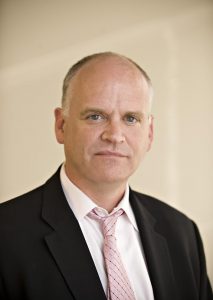
RON FOURNIER
Maybe it stems from spending his youth on Detroit’s Northeast side, where his dad was a cop, but Ron Fournier is certainly not one to back down from a spirited conversation, especially not one about politics. If you follow his Twitter account, and you should, you’ll see the president of the Michigan PR Firm Truscott Rossman single-handedly initiates pointed political and civic social discourse, with good authority to do so. His career spans a start as a local reporter in Arkansas during a time when Bill Clinton was still governor, to heading the Associated Press bureau in Washinton D.C., to working the early days of the Obama presidency, then becoming publisher and editor of Crain’s Detroit Business. Interest in politics is in his blood.
So, I thought, who better to ask then Ron about our looming political divide, about our conclusive lack of federal-level guidance through this time of crisis and a perspective on where Detroit sits in the midst of this healthcare and economic turmoil. Was I looking for answers? Of course, we ache for guidance from wickedly smart people like Ron. Was I expecting answers? No. What I expected was a charged conversation to stir the blood and get the mind ticking as we look at the issues we are facing all around us. And that I got.
The following Q&A looks at the time between today and November 2020, and Biden and Trump. We talked about the status of both the Republican and Democratic Party. We talked about the hardships the Millennial generation faces as the “sacrificial” generation if we don’t get out of their way and allow them to build their own destiny, and we talked about where America is headed amid an increasingly murky future. politics
DOES REMOVING THE ASSUMED CONTROL OF POLITICAL POWER EFFECT CHANGE?
We still have the ability to make all these big changes, whether it’s through a constitutional amendment or choosing to elect different people, but the problem is that we as a people aren’t insisting on better. Technology has given us immense power. You now hold in your cell phone more power than I had when writing for The Associated Press before the emergence of the Internet. In the technology of the mobile phone, you have more power than any voter has ever had. And instead of using it to demand changes to our politics, we’re using it to sort ourselves, physically, ideologically and intellectually into two groups of lemmings. That’s the shame of it.
There was a time in my career where I found myself writing about who would be the next Lincoln, who would be the next Teddy Roosevelt, who would be the next great president, and now I realize it’s not a leadership problem, it’s a “We the people” problem. We are not demanding better out of leaders; we’re not demanding better out of our parties.
If you’re a liberal voter, you should have been more upset by how Hillary Clinton handled her emails, than a conservative voter was. And if you’re a conservative voter, you should be more upset by the way Donald Trump is handling everything about the presidency than a democrat would be.
The problem is we only care about how bad the other side is, and we don’t hold our own side accountable. It’s a “We the people” problem because we’re not being very good citizens right now, as people.
WHAT DO YOU SEE AS THE FUTURE STATE OF THE TWO POLITICAL PARTIES?
Two years ago, you could say Republicans had three things that they all stood for but now Republicans only stand for whatever Donald Trump tells them to stand for. Now we have two parties that I think are morally and intellectually bankrupt, and I say that as someone whose politics is left of center. There’s a lot of factors that have gone on to dramatically weaken both parties.
We now have two very historically weak political parties, and at the same time, they have a monopoly on the system. The rules are written in such a way by this duopoly that it’s hard for a third party or a fourth party or any counter voices to get in. These two very weak parties aren’t connected to the public, they’re not connected to the times, and they have helped create a political system that now disincentivizes cooperation and compromise, but rather incentivizes candidates to chase the almighty buck and only worry about the primary. So we now have at the same time, a very weak party structure and this duopoly that gives us the kind of politics that very few Americans now respect.
WHAT COULD THE DEMOCRATIC PARTY STAND FOR?
A great 21st-century party could stand for huge structural reform, looking at all of the pillars of our politics that are now so frayed and inject new thinking. Redistricting reform, reform of money and politics, reform the way we vote. We should be able to vote anytime all year round when we want where we want, how we want. This idea that we have to show up on a Tuesday in November is just ludicrous.
In a once in a century crisis, the political system is ill-equipped to deal with a pandemic. All the Democrats stand for right now is beating Donald Trump, which by the way I’m all for, I think, Trump is the worst president in the history of this country, and I don’t say that flippantly, I’ve really thought about it and I really think he’s the worst president we’ve ever had. But, the party’s got to stand for something other than being against Donald Trump.
DO FACTS, ACCOUNTABILITY, MATTER NOW MORE THEN EVER?
Human beings are wired to lie and to be lied to. If you think back to the first moments of civilization when we followed the tribal leader, it was always a man; it was the strongest man in the tribe, and we would follow that leader over a cliff or up a hill to kill whatever he told us to kill. We evolved as a species. As a Republic form of government we elected people who we trusted to be a little bit better than us and to represent us while we went out and lived our lives. And that worked pretty well, for some time. They were called Gatekeepers.
Now, there was a problem with your gatekeepers who were all white, middle-aged men, but when Walter Cronkite told us the Vietnam War was over, we believed the Vietnam War was over. When a group of Republicans walked up Pennsylvania Avenue and told Nixon, it was time to resign, Nixon resigned. When 90% of us tuned in to I Love Lucy in the 1950s during the commercial break we were sold Ivory soap, so we bought Ivory soap. It wasn’t perfect, but we had a common set of facts. Those gatekeepers told us what was right and what was wrong.
That consensus thinking went away. In the early aughts, that went away with the rise of the Internet, and we each became our own gatekeeper. And what I naively thought was going to happen was, we would use this power of the Internet to be more closely connected with one another and to be better informed and to therefore be better citizens, and I could not have been more wrong,
We’ve used this power to devolve back to where we were in early tribal Europe, where now we follow our leader blindly off a cliff, or up the mountain, while we think all create our own truth, when actually we let somebody else create our truth. That’s where we are now.
There are people in this country who are convinced that Donald Trump, for example, walled off China from America from the first moment of the pandemic. Well, you and I know that’s simply not true. You know it’s a fact that 40,000 people still came from China at the start of the pandemic, and we know that most of the virus in the U.S. came from Europe, that’s a fact. It’s also a fact that Trump misunderestimated this pandemic and is two months behind in responding to it.
But, there are people in this country who you’ll never convince otherwise. So I don’t know how you solve this because it’s not good enough to just throw the bums out. We need to be better citizens.
WHAT ABOUT OUR YOUNGER GENERATIONS?
I’ve written a lot about the Millennial generation, less on Gen Y, but Millennials actually have the makings for being the next greatest generation. You know, they tend to be more purpose-driven in life, certainly good at bootstrapping. They are more consensus building. They certainly don’t shirk away from the challenge of looking at things unconventionally. I’ve been waiting for Millenials to say “Enough of this shit. Get out of my way so I can get shit done.”
I think the generation behind them is going to be even more disruptive, in a good way. Now I think too many people focus and say “Oh they’re gonna be more liberal.” You know, I’ve got to think that the old conservative-liberal paradigm is about to die. We’re going to be looking at two different kinds of types of political cats for the future. Instead of liberals and conservatives, or Democrats, Republicans, you’re gonna have status quo-ers and reformers.
I’m hoping that’s what happens and you’ll have new people who want things the old way, and the people who want to blow it up.
IF THE GENERAL POPULACE WANTED CHANGE, WHY DIDN’T A SANDERS OR BUTTIGIEG MAKE IT?
I don’t know; I really don’t know. It’s not the old days when it was a few politicians in a smoke-filled room who decided who the nominee was, so it was easy to see what will happen. I think they saw that Bernie Sanders would be easily beat by Trump, that he was too extreme, and I actually think that was a wise call, and they were also afraid. Democratic voters are so determined to get Trump out, that they didn’t want to take a risk on someone like a Buttigieg. So they went with the safest choice in betting that Trump would be beat.
WHAT DOES PRE, AND POST, NOVEMBER 2020 LOOK LIKE?
If you put a gun to my head, I would always give the advantage to the incumbent, especially in a time of great tragedy. For all things that Trump has done wrong and for all the things that he has gone against he still has the upper hand. What people really want is change. What people have told us in every election since ’92 is they want change. I don’t think the kind of change Trump is bringing is the right kind of change, and most Americans don’t either.
What the Democratic Party decided to do this time is to butt up against a disruptive incumbent, Donald Trump, with a status quo incumbent. Another old guy, but an old guy whose argument is going to be, let’s go back to when things were more sane. The problem with that argument is nobody was really happy with the way things were in politics before Trump.
But I really think the Democratic Party was better off anchoring up against Trump with somebody who was young and promising, bringing true change and who would have looked and acted differently than Trump. I think there is still a small chance that there could be another nominee, other than Biden, but obviously, it’s most likely going to be Biden.
Biden could certainly beat Trump, but it’s not going to be as easy as people think. Trump still has a slight advantage because of all the powers of incumbency, and because Biden has proven himself, what, two or three times now, to be a weak candidate, he’s simply not a very good candidate. I think he’s a good man and he was a decent Senator, but he’s not a good presidential candidate.
Now he’s going up against a well-oiled machine that has been running since his first day in office in 2016. Biden still hasn’t got this general election campaign together, and Trump’s trench has literally been together since day one.
WHERE DOES DETROIT FALL IN ALL OF THIS?
There are some great examples locally of us reinventing our party politics and local politics. It’s social entrepreneurship at the core, and about being more dynamic. Detroit is a place where, for all the problems we have had that we were climbing out of, generally speaking, the political community, the business community, and the nonprofit community, all come together to try to create a great city that is diverse and inclusive.
Now, this pandemic could not have come at a worse time, we didn’t quite yet have the foundation built in Detroit. It’s great what’s happening downtown and what’s happening in Midtown, but we were just now starting to get some investment in the neighborhoods and that, of course, is now likely dry up. And now I worry about will the business community be as committed, will the political community be as committed, will the nonprofit community from all over the country be as committed as it has been to Detroit over the past five years.
I would just encourage you, whether you’re a political leader or a business leader, a nonprofit leader; our futures are all entwined together. We’re going to rise or fall together, and our mission is to help people who’ve been left behind by this new economy, in this new democracy, in this new this technological revolution and lift them up. I’ve been so impressed by that general ethos here in Detroit. It’s one reason why I was so excited to move back, and I hope we don’t lose that when things get hard.
politics politics politics Politics
This interview has been edited for length and clarity.
Post Views: 136
Politics on Steroids: A Topical Discussion on What Should Matter to You With a Detroit Opinion Maker
“It’s a ‘We the People Problem.'” Ron Fournier, The PR Executive, Gets Real on the Current State Affairs in America. And in Detroit
RON FOURNIER
Maybe it stems from spending his youth on Detroit’s Northeast side, where his dad was a cop, but Ron Fournier is certainly not one to back down from a spirited conversation, especially not one about politics. If you follow his Twitter account, and you should, you’ll see the president of the Michigan PR Firm Truscott Rossman single-handedly initiates pointed political and civic social discourse, with good authority to do so. His career spans a start as a local reporter in Arkansas during a time when Bill Clinton was still governor, to heading the Associated Press bureau in Washinton D.C., to working the early days of the Obama presidency, then becoming publisher and editor of Crain’s Detroit Business. Interest in politics is in his blood.
So, I thought, who better to ask then Ron about our looming political divide, about our conclusive lack of federal-level guidance through this time of crisis and a perspective on where Detroit sits in the midst of this healthcare and economic turmoil. Was I looking for answers? Of course, we ache for guidance from wickedly smart people like Ron. Was I expecting answers? No. What I expected was a charged conversation to stir the blood and get the mind ticking as we look at the issues we are facing all around us. And that I got.
The following Q&A looks at the time between today and November 2020, and Biden and Trump. We talked about the status of both the Republican and Democratic Party. We talked about the hardships the Millennial generation faces as the “sacrificial” generation if we don’t get out of their way and allow them to build their own destiny, and we talked about where America is headed amid an increasingly murky future. politics
DOES REMOVING THE ASSUMED CONTROL OF POLITICAL POWER EFFECT CHANGE?
We still have the ability to make all these big changes, whether it’s through a constitutional amendment or choosing to elect different people, but the problem is that we as a people aren’t insisting on better. Technology has given us immense power. You now hold in your cell phone more power than I had when writing for The Associated Press before the emergence of the Internet. In the technology of the mobile phone, you have more power than any voter has ever had. And instead of using it to demand changes to our politics, we’re using it to sort ourselves, physically, ideologically and intellectually into two groups of lemmings. That’s the shame of it.
If you’re a liberal voter, you should have been more upset by how Hillary Clinton handled her emails, than a conservative voter was. And if you’re a conservative voter, you should be more upset by the way Donald Trump is handling everything about the presidency than a democrat would be.
The problem is we only care about how bad the other side is, and we don’t hold our own side accountable. It’s a “We the people” problem because we’re not being very good citizens right now, as people.
WHAT DO YOU SEE AS THE FUTURE STATE OF THE TWO POLITICAL PARTIES?
Two years ago, you could say Republicans had three things that they all stood for but now Republicans only stand for whatever Donald Trump tells them to stand for. Now we have two parties that I think are morally and intellectually bankrupt, and I say that as someone whose politics is left of center. There’s a lot of factors that have gone on to dramatically weaken both parties.
We now have two very historically weak political parties, and at the same time, they have a monopoly on the system. The rules are written in such a way by this duopoly that it’s hard for a third party or a fourth party or any counter voices to get in. These two very weak parties aren’t connected to the public, they’re not connected to the times, and they have helped create a political system that now disincentivizes cooperation and compromise, but rather incentivizes candidates to chase the almighty buck and only worry about the primary. So we now have at the same time, a very weak party structure and this duopoly that gives us the kind of politics that very few Americans now respect.
WHAT COULD THE DEMOCRATIC PARTY STAND FOR?
A great 21st-century party could stand for huge structural reform, looking at all of the pillars of our politics that are now so frayed and inject new thinking. Redistricting reform, reform of money and politics, reform the way we vote. We should be able to vote anytime all year round when we want where we want, how we want. This idea that we have to show up on a Tuesday in November is just ludicrous.
In a once in a century crisis, the political system is ill-equipped to deal with a pandemic. All the Democrats stand for right now is beating Donald Trump, which by the way I’m all for, I think, Trump is the worst president in the history of this country, and I don’t say that flippantly, I’ve really thought about it and I really think he’s the worst president we’ve ever had. But, the party’s got to stand for something other than being against Donald Trump.
DO FACTS, ACCOUNTABILITY, MATTER NOW MORE THEN EVER?
Human beings are wired to lie and to be lied to. If you think back to the first moments of civilization when we followed the tribal leader, it was always a man; it was the strongest man in the tribe, and we would follow that leader over a cliff or up a hill to kill whatever he told us to kill. We evolved as a species. As a Republic form of government we elected people who we trusted to be a little bit better than us and to represent us while we went out and lived our lives. And that worked pretty well, for some time. They were called Gatekeepers.
That consensus thinking went away. In the early aughts, that went away with the rise of the Internet, and we each became our own gatekeeper. And what I naively thought was going to happen was, we would use this power of the Internet to be more closely connected with one another and to be better informed and to therefore be better citizens, and I could not have been more wrong,
We’ve used this power to devolve back to where we were in early tribal Europe, where now we follow our leader blindly off a cliff, or up the mountain, while we think all create our own truth, when actually we let somebody else create our truth. That’s where we are now.
There are people in this country who are convinced that Donald Trump, for example, walled off China from America from the first moment of the pandemic. Well, you and I know that’s simply not true. You know it’s a fact that 40,000 people still came from China at the start of the pandemic, and we know that most of the virus in the U.S. came from Europe, that’s a fact. It’s also a fact that Trump misunderestimated this pandemic and is two months behind in responding to it.
But, there are people in this country who you’ll never convince otherwise. So I don’t know how you solve this because it’s not good enough to just throw the bums out. We need to be better citizens.
WHAT ABOUT OUR YOUNGER GENERATIONS?
I’ve written a lot about the Millennial generation, less on Gen Y, but Millennials actually have the makings for being the next greatest generation. You know, they tend to be more purpose-driven in life, certainly good at bootstrapping. They are more consensus building. They certainly don’t shirk away from the challenge of looking at things unconventionally. I’ve been waiting for Millenials to say “Enough of this shit. Get out of my way so I can get shit done.”
I think the generation behind them is going to be even more disruptive, in a good way. Now I think too many people focus and say “Oh they’re gonna be more liberal.” You know, I’ve got to think that the old conservative-liberal paradigm is about to die. We’re going to be looking at two different kinds of types of political cats for the future. Instead of liberals and conservatives, or Democrats, Republicans, you’re gonna have status quo-ers and reformers.
I’m hoping that’s what happens and you’ll have new people who want things the old way, and the people who want to blow it up.
IF THE GENERAL POPULACE WANTED CHANGE, WHY DIDN’T A SANDERS OR BUTTIGIEG MAKE IT?
I don’t know; I really don’t know. It’s not the old days when it was a few politicians in a smoke-filled room who decided who the nominee was, so it was easy to see what will happen. I think they saw that Bernie Sanders would be easily beat by Trump, that he was too extreme, and I actually think that was a wise call, and they were also afraid. Democratic voters are so determined to get Trump out, that they didn’t want to take a risk on someone like a Buttigieg. So they went with the safest choice in betting that Trump would be beat.
WHAT DOES PRE, AND POST, NOVEMBER 2020 LOOK LIKE?
If you put a gun to my head, I would always give the advantage to the incumbent, especially in a time of great tragedy. For all things that Trump has done wrong and for all the things that he has gone against he still has the upper hand. What people really want is change. What people have told us in every election since ’92 is they want change. I don’t think the kind of change Trump is bringing is the right kind of change, and most Americans don’t either.
What the Democratic Party decided to do this time is to butt up against a disruptive incumbent, Donald Trump, with a status quo incumbent. Another old guy, but an old guy whose argument is going to be, let’s go back to when things were more sane. The problem with that argument is nobody was really happy with the way things were in politics before Trump.
But I really think the Democratic Party was better off anchoring up against Trump with somebody who was young and promising, bringing true change and who would have looked and acted differently than Trump. I think there is still a small chance that there could be another nominee, other than Biden, but obviously, it’s most likely going to be Biden.
Biden could certainly beat Trump, but it’s not going to be as easy as people think. Trump still has a slight advantage because of all the powers of incumbency, and because Biden has proven himself, what, two or three times now, to be a weak candidate, he’s simply not a very good candidate. I think he’s a good man and he was a decent Senator, but he’s not a good presidential candidate.
Now he’s going up against a well-oiled machine that has been running since his first day in office in 2016. Biden still hasn’t got this general election campaign together, and Trump’s trench has literally been together since day one.
WHERE DOES DETROIT FALL IN ALL OF THIS?
There are some great examples locally of us reinventing our party politics and local politics. It’s social entrepreneurship at the core, and about being more dynamic. Detroit is a place where, for all the problems we have had that we were climbing out of, generally speaking, the political community, the business community, and the nonprofit community, all come together to try to create a great city that is diverse and inclusive.
I would just encourage you, whether you’re a political leader or a business leader, a nonprofit leader; our futures are all entwined together. We’re going to rise or fall together, and our mission is to help people who’ve been left behind by this new economy, in this new democracy, in this new this technological revolution and lift them up. I’ve been so impressed by that general ethos here in Detroit. It’s one reason why I was so excited to move back, and I hope we don’t lose that when things get hard.
politics politics politics Politics
This interview has been edited for length and clarity.
LATEST STORIES

Kim Kisner 
Maria Kornacki 
Maria Kornacki 
Kim Kisner 
Maria Kornacki 
Kim Kisner 
Maria Kornacki 
Kim Kisner
MoreThe Venice of Detroit, in a Neighborhood
6 Hip Thrift Stores in Detroit & Beyond for the Best Vintage and Recirculated Clothes
6 Strong Art initiatives in Detroit & Surrounds to Experience
Gretchen Valade – Making a Name for Herself as She Indulges in the City’s Offerings
Most Fun Things to Do in Detroit for an Iconic Experience
It Takes a Village – and Mama Shu is Building One
7 Top Wedding Planners in Metro Detroit to Book Now for Your Special Day
Michigan Central and the Impact on Corktown
MORE DETROITISIT STORIES
Ivana Kalafatic
FEATURED VIDEO
More from Detroitisit
The Venice of Detroit, in a Neighborhood
6 Hip Thrift Stores in Detroit & Beyond for the Best Vintage and Recirculated Clothes
6 Strong Art initiatives in Detroit & Surrounds to Experience
Gretchen Valade – Making a Name for Herself as She Indulges in the City’s Offerings
Most Fun Things to Do in Detroit for an Iconic Experience
It Takes a Village – and Mama Shu is Building One